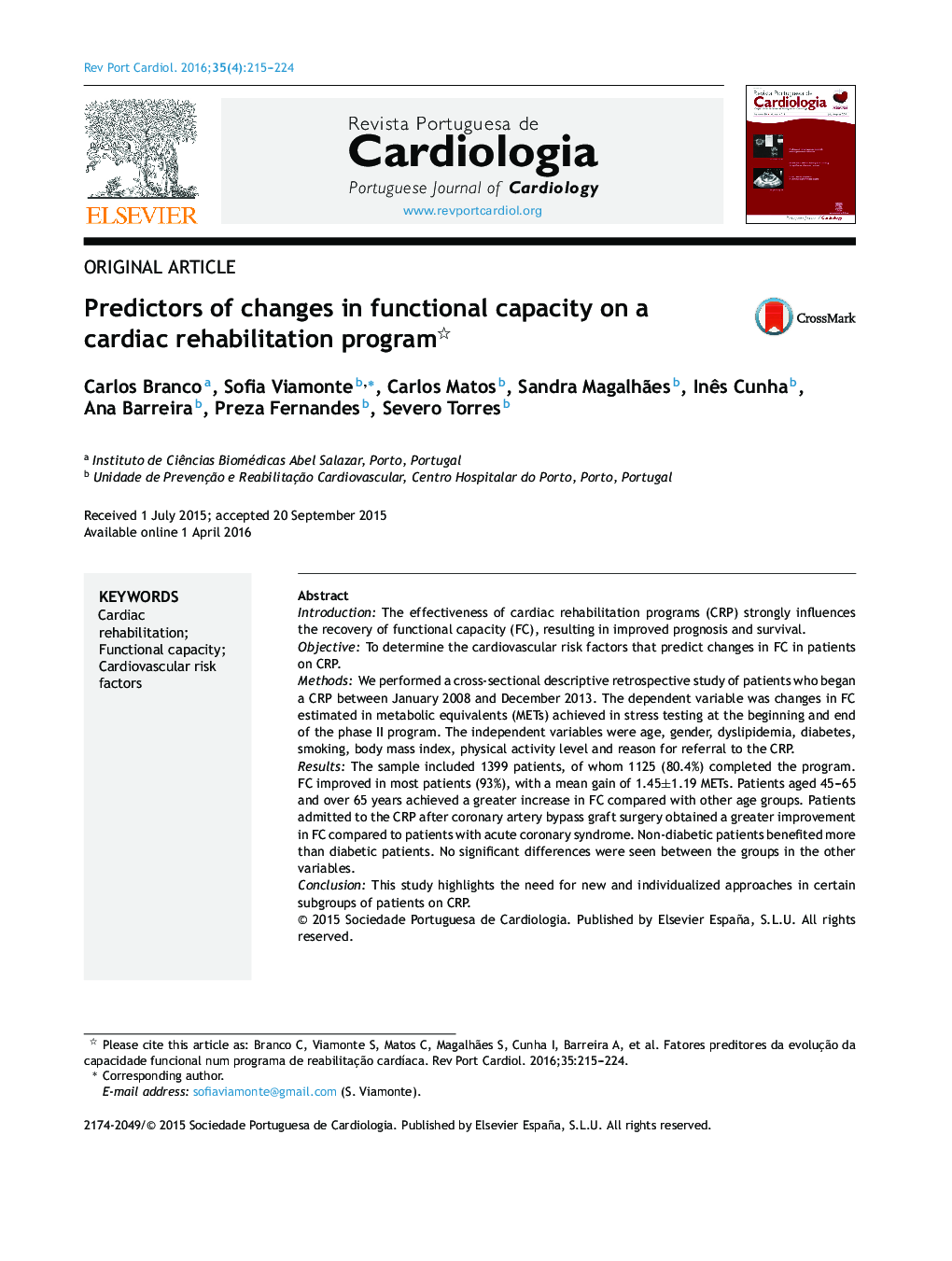| کد مقاله | کد نشریه | سال انتشار | مقاله انگلیسی | نسخه تمام متن |
|---|---|---|---|---|
| 3019891 | 1182274 | 2016 | 10 صفحه PDF | دانلود رایگان |
IntroductionThe effectiveness of cardiac rehabilitation programs (CRP) strongly influences the recovery of functional capacity (FC), resulting in improved prognosis and survival.ObjectiveTo determine the cardiovascular risk factors that predict changes in FC in patients on CRP.MethodsWe performed a cross-sectional descriptive retrospective study of patients who began a CRP between January 2008 and December 2013. The dependent variable was changes in FC estimated in metabolic equivalents (METs) achieved in stress testing at the beginning and end of the phase II program. The independent variables were age, gender, dyslipidemia, diabetes, smoking, body mass index, physical activity level and reason for referral to the CRP.ResultsThe sample included 1399 patients, of whom 1125 (80.4%) completed the program. FC improved in most patients (93%), with a mean gain of 1.45±1.19 METs. Patients aged 45–65 and over 65 years achieved a greater increase in FC compared with other age groups. Patients admitted to the CRP after coronary artery bypass graft surgery obtained a greater improvement in FC compared to patients with acute coronary syndrome. Non-diabetic patients benefited more than diabetic patients. No significant differences were seen between the groups in the other variables.ConclusionThis study highlights the need for new and individualized approaches in certain subgroups of patients on CRP.
ResumoIntroduçãoA eficácia dos programas de reabilitação cardíaca (PRC) associa-se fortemente à recuperação da capacidade funcional (CF) dos doentes, traduzindo-se na melhoria do prognóstico e na sobrevida.ObjetivoDeterminar os fatores de risco cardiovascular que podem atuar como preditores da evolução da CF em doentes em PRC.MétodosEstudo descritivo transversal retrospetivo de doentes que iniciaram um PRC, entre janeiro de 2008 e dezembro de 2013. A variável dependente é a evolução da CF estimada em equivalentes metabólicos (MET) obtidos na prova de esforço, realizada no início e no final da fase II do programa. As variáveis independentes foram a idade, género, dislipidemia, diabetes mellitus, hábitos tabágicos, índice de massa corporal, nível de atividade física e diagnóstico de admissão a PRC.ResultadosA amostra incluiu 1399 doentes dos quais 1125 (80,4%) finalizaram a fase II do programa. Verificou-se melhoria da CF na maioria dos doentes (93%) com um ganho médio de 1,45 ± 1,19 MET. Os doentes na faixa etária (45-65] e superior a 65 anos obtiveram um incremento na CF superior quando comparados com a restante faixa etária. Os doentes admitidos para PRC após Coronary Artery Bypass Graft obtiveram um benefício superior da CF quando comparados com doentes com síndrome coronária aguda. Os doentes não diabéticos obtiveram um incremento da sua CF superior comparativamente com doentes diabéticos. Nas restantes variáveis estudadas não se obteve uma diferença significativa entre os grupos.ConclusãoEste estudo salienta a necessidade de novas e individualizadas estratégias de atuação em determinados subgrupos de doentes em PRC.
Journal: Revista Portuguesa de Cardiologia (English Edition) - Volume 35, Issue 4, April 2016, Pages 215–224
